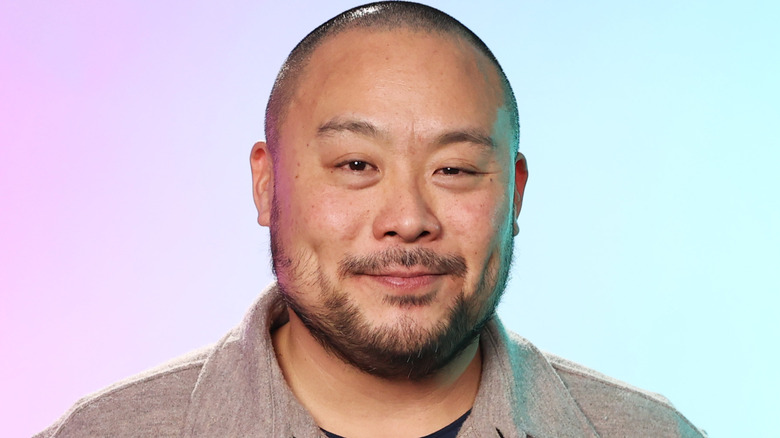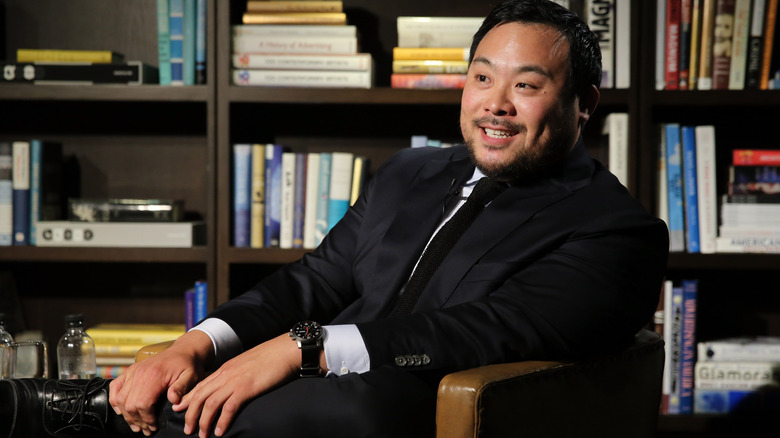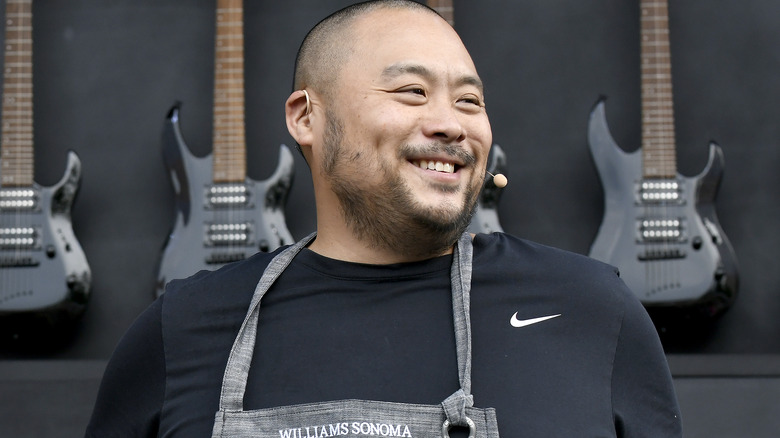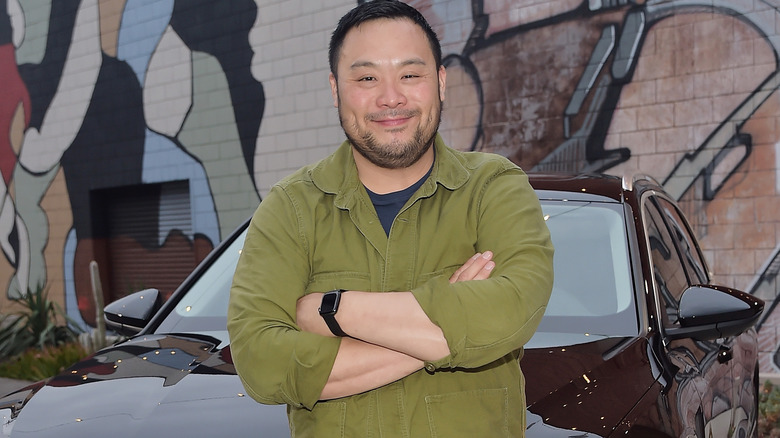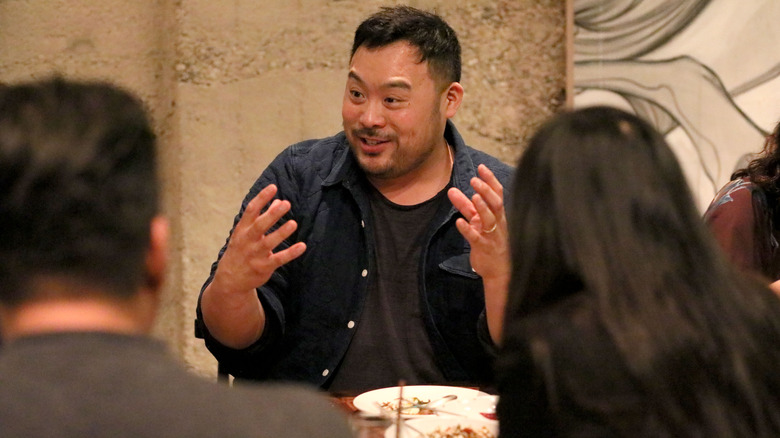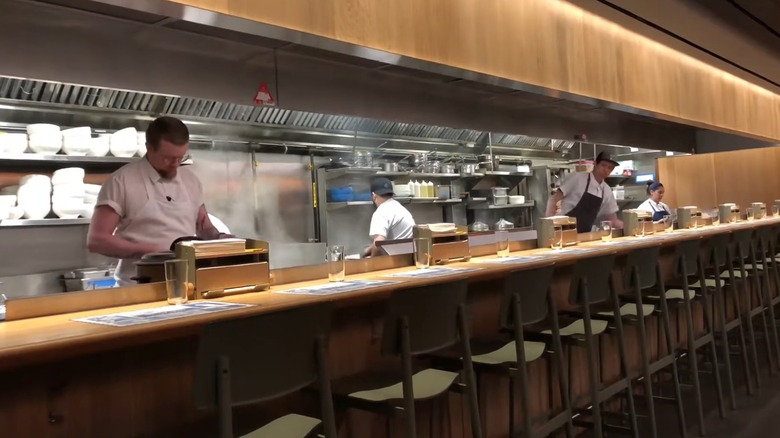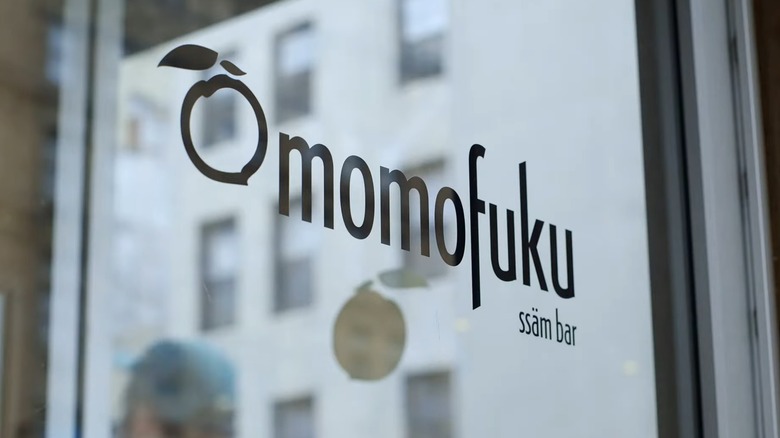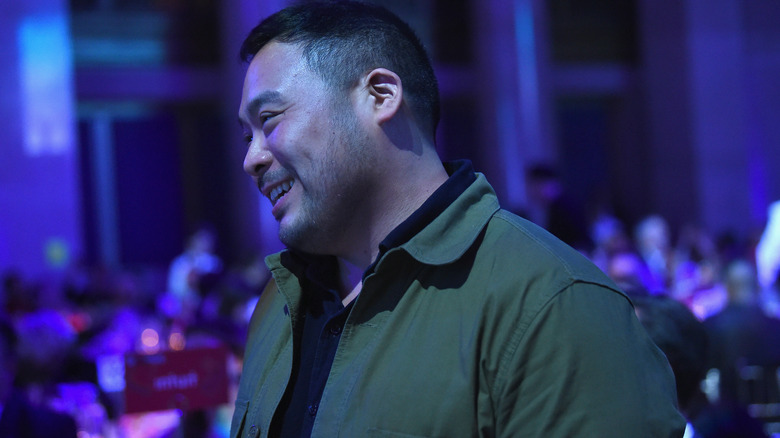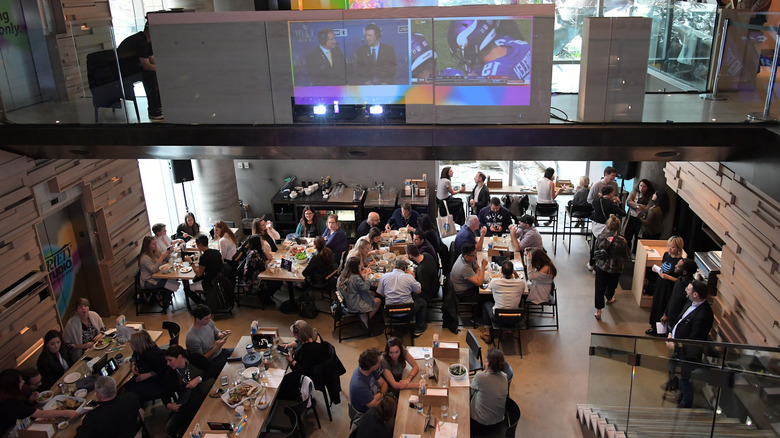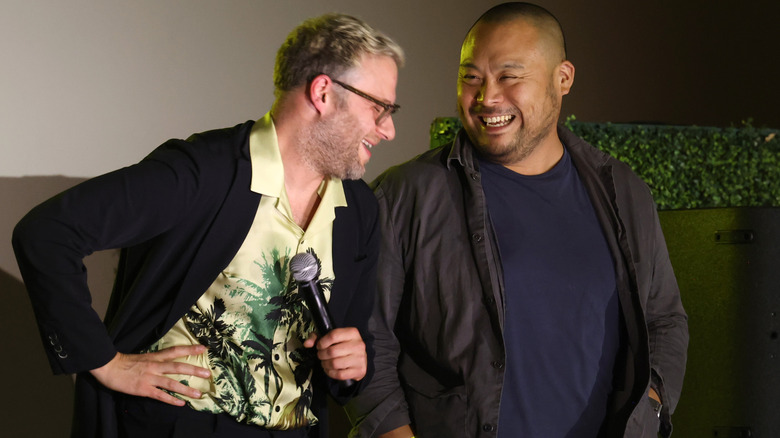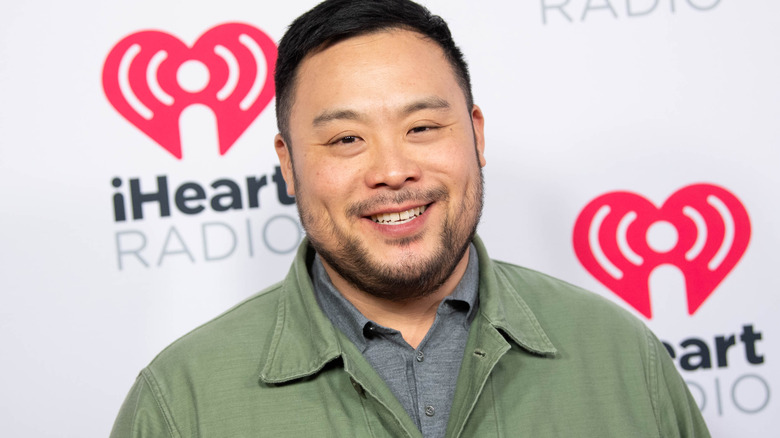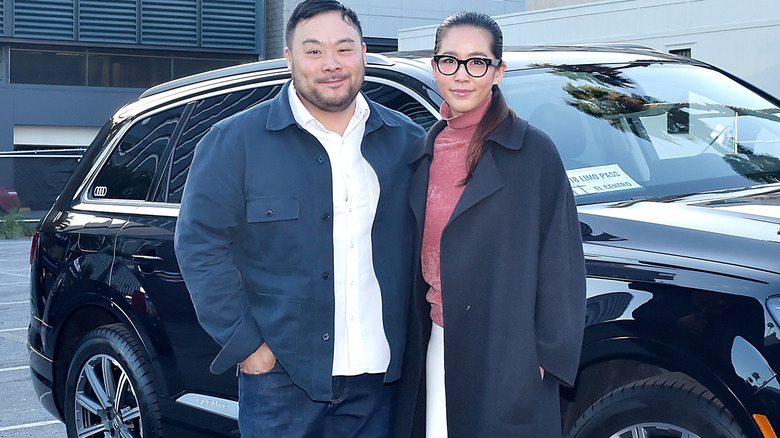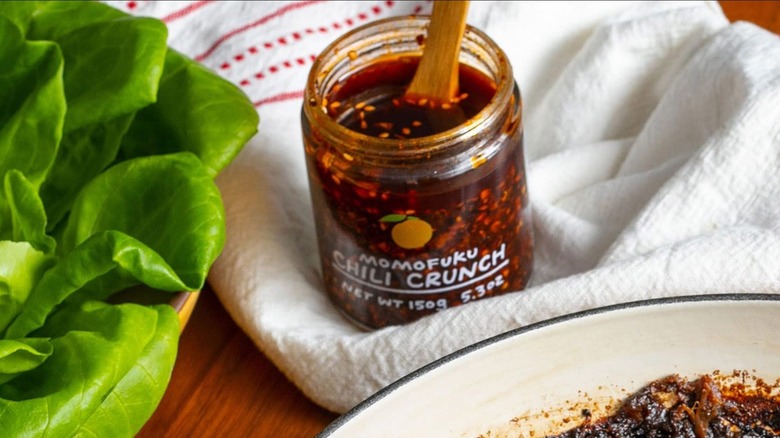The Transformation Of Chef David Chang
Between his multiple restaurants, his Momofuku brand of prepackaged food products, his early involvement in the career of Milk Bar founder Christina Tosi, and regular appearances in various forms of popular media, chef David Chang is a notable public figure in virtually all major sectors of the food and culinary entertainment industries. While much of the attention Chang merits is positive — including garnering top restaurant accolades and even having multiple books he authored land on the New York Times Best Sellers list — he's also become the subject of some noteworthy criticisms and controversies in recent years.
Chang's ascent to his position of prominence was defined by a string of perhaps improbable successes. While he eventually reached the point of widespread acclaim, it was only after a prolonged period of working hard to overcome some significant setbacks. Those struggles ultimately shaped him into the famously talented and notoriously multifaceted celebrity chef he has become in the present day.
Through high school and in college, he pursued interests other than food
David Chang was far from destined for a career in food — through all of high school and even the entirety of his college years, Chang had yet to begin his pursuit of a profession as a chef or restaurateur.
As a child, Chang golfed competitively, following something of an expected trajectory based on the fact that his father owned a golf supply store. However, Chang took a big step back from the sport when he was just 13 and later failed to qualify for his high school's golf team. Then, in college, he decided to study religion based on his personal disinterest in his family's Presbyterian faith. For spiritual guidance, he preferred the work of Henry David Thoreau.
After graduating, Chang still hadn't quite settled on the path to his present-day success. At first he held a couple of office jobs. He found that work far from fulfilling, and it was this perhaps directionless period in his life that helped inspire him to follow his burgeoning passion for the culinary arts.
His passion for restaurant work developed while he was teaching English in Japan
After his stint as an office worker, the next big chapter of David Chang's life kicked off with a gig teaching English in Japan. He ended up living and working in a small town a little over an hour south of Osaka. It was there that he first attempted to study what it took to prepare food in a commercial kitchen, doing his best with his limited Japanese language skills to shadow the chefs at a local ramen shop.
While the dish wasn't always key to his career aspirations, Chang was a ramen guy for much of his life up to that point. In typical college student fashion, Chang made instant ramen a staple of his diet as a teen and young adult. Then, during his junior year of college, he studied abroad in London and frequented a ramen chain called Wagamama that inspired him to cook.
In Japan, Chang decided that he should return to the U.S. if he wanted to seriously pursue his newfound professional interest in this longtime personal passion for food.
His culinary education began in New York City and revolved around fine French dining
David Chang's career pivot was explicitly contrary to advice from his father, who had worked in commercial kitchens himself and described the work in unglamorous terms. While that may have deterred Chang in the past, he returned to the United States and began studying at a school in New York City called the French Culinary Institute.
By the time he graduated in the year 2000, when he was about 22 years old, he landed a position as a line cook at prolific restaurateur Jean-Georges Vongerichten's upscale French restaurant, The Mercer Kitchen. While still at The Mercer, Chang decided he wanted to work at celebrity chef Tom Colicchio's new venture called Craft and successfully pivoted. After that he transitioned to prep work at another fancy French restaurant called Café Boulud under the proprietorship of acclaimed chef Daniel Boulud. Chang eventually decided to leave Café Boulud after finding out his mother had been diagnosed with cancer, concluding this brief but foundational period of his culinary education.
He briefly returned to Japan to study the art of noodles
It was while he was still working at Craft that David Chang started to dream of opening his own restaurant. After leaving Café Boulud but before setting out as a restaurateur, however, Chang returned to Japan, this time with the explicit goal of perfecting the art of noodle-making (these days, he says the one ingredient he always adds to noodles is toasted sesame oil).
The basis for his return trip was an opportunity to work in a ramen shop in Tokyo owned by a family friend. After finding out that this particular ramen shop wasn't really all that great, he left it behind for a gig making noodles at a restaurant located in the Park Hyatt Tokyo hotel. In total, he spent approximately two years studying his craft in Japan.
His decision to pursue Japanese noodle-making rather than remain in the world of fine French dining was inspired by both his appreciation for restaurant culture in China and Japan as well as a desire to set himself apart from his peers. "I think if I was better at cooking, compared to my peer group, especially the restaurants I was in, maybe I would have only cooked French food," he told NPR interviewer Terry Gross in 2020. "But so much of how I wound up today was because I didn't fit in and I had to find my way and get some kind of expertise that no one else had."
Running a restaurant was a struggle at first
Finally, in 2004, after returning from his two-year stint in Japan — with $130,000 he borrowed from his dad and some of his dad's friends — David Chang opened up his first restaurant, Momofuku Noodle Bar. Since everyone he approached personally turned down the opportunity to own a stake in the business, Chang teamed up with a restaurant worker named Joaquin Baca who responded to an online ad Chang posted looking for a business partner.
Momofuku Noodle Bar's menu initially consisted of just a few dishes and resembled something far closer to that of a traditional ramen restaurant than the unique sort of Asian fusion cuisine with which Chang would come to be associated. Together, Chang and Baca handled all of the restaurant's day-to-day operations. While they periodically hired some additional staff members, they lost them just as quickly, whether they were fired or they quit. Meanwhile, Chang coveted the success of a Japanese restaurant across the street while Momofuku Noodle Bar failed to draw in customers with any degree of consistency.
Eventually, the pair decided that, as long as the restaurant was struggling, they might as well have fun with it. It was the creative dishes they started serving after just about hitting rock bottom that turned their fortunes around and led to Momofuku Noodle Bar becoming a major player in the mid-2000s New York City restaurant scene.
Taking risks saved his second restaurant, Ssäm Bar, from becoming an expensive failure
David Chang decided to open a second restaurant in 2006, still with little industry experience relative to his considerable ambition. At first, this new spot revolved mostly around a Korean dish called ssam and was appropriately called Momofuku Ssäm Bar. Chang's take on the dish meant presenting it in a manner akin to a Chipotle burrito, allowing customers to customize the ingredients and even wrapping it in a non-traditional flour tortilla. Alternatives to that burrito-ified ssam included rice bowls and steam buns — foods that Chang ate at home and that he thought would adapt well to a burrito bar concept.
While that idea sounds well-suited to the restaurant landscape of the 2020s, back in 2006 Ssäm Bar struggled to attract customers. Chang opened Ssäm Bar with a $1 million bank loan, so the restaurant's failure could have been costly. The restaurant didn't fail, however, but just like at Momofuku Noodle Bar, success meant completely retooling its core concept. Key to its big turnaround was opening for late-night service and catering to an audience consisting largely of New York City chefs who had just finished up their shifts. The late-night menu was considerably more upscale and included the large-format bo ssam dish that would become a staple of Chang's future restaurants like Majordomo in Los Angeles and Momofuku in Las Vegas.
Mental health struggles have affected his work as a chef and restauranteur
David Chang recounted struggling with his mental health as early as his teenage years, explaining to The New Yorker that this was perhaps why he didn't make his high school's golf team. "I was too much of a head case," he said.
The first time Chang visited a psychiatrist was in 2003, just prior to opening Momofuku Noodle Bar. In therapy he was diagnosed with bipolar disorder. He told NPR in 2020 that the first experience he can recount with mania was when he was living in Japan. Then, after he returned to the U.S., he struggled with depression, reaching his mental health low point while he was with Café Boulud. He even attributed the rashness with which he opened Momofuku Noodle Bar to depression. "A 26-year-old with very little experience should never open a restaurant — and that's what happened. If I wasn't depressed, I probably wouldn't name the restaurant as silly sounding as 'Momofuku,' " he said.
In that same interview, Chang owned up to treating his employees poorly once he became a restaurateur and described change as a still-ongoing process. As a sort of response to the publication of Chang's 2020 memoir "Eat a Peach," author Hannah Selinger wrote a lengthy editorial for Eater detailing some of his poor behavior, which she experienced personally. Even if Chang admitted to mistreating his employees and vocally apologized, Selinger argued that he hadn't necessarily redressed his wrongdoing.
His third restaurant earned two Michelin stars and helped kick off his rapid career ascent
By the time David Chang decided to open his third restaurant, his success was no longer all that unlikely. Food & Wine magazine named him one of the best chefs of 2006. The following year the James Beard Foundation selected him as its Rising Star Chef of the Year. Bon Appétit and GQ both named him Chef of the Year in 2007. It was 2008 when he opened Momofuku Ko, his first restaurant designed to be explicitly upscale.
Whereas Momofuku Noodle Bar and Ssäm Bar were inspired by casual dining in Japan and China, Momofuku Ko required a reservation to sit in its exclusive, 12-seat dining room and try its tasting menu. This time around, Chang's ambition paid off more or less from the start when the restaurant earned two Michelin stars in 2009.
Momofuku Ko's success kicked off Chang's ascent from New York City celebrity to international superstar. In 2011, for example, he both opened a Momofuku-branded restaurant in Australia and further expanded his footprint in New York. The following year he opened a multi-restaurant space in Toronto. That expansion kept up somewhat consistently through the 2010s, and it wasn't until the 2020s that a series of closures first started to diminish his sizable reach in the international restaurant scene.
He broke out as a TV star in 2010
Plenty of David Chang fans were likely first exposed to his work not through his food but his somewhat frequent appearances on TV. Chang's first recurring TV role was in one of showrunner David Simon's first ventures after "The Wire" titled "Treme." Food plays a major role in "Treme," and Chang portrays a fictionalized version of himself in seven episodes. The same year as his "Treme" debut, he guested on an episode of the "Late Show With David Letterman," cementing 2010 as his breakout in Hollywood. Since then he's become a fixture of food TV, with appearances on shows like "Anthony Bourdain: No Reservations," "The Mind of a Chef," "Top Chef," "The Chef Show," and others.
Chang became a Netflix star in 2018 as the host of "Ugly Delicious." This turned out to be the start of a fruitful partnership — not only did "Ugly Delicious" return for a second season, but Chang subsequently hosted "Breakfast, Lunch, & Dinner" and "Dinner Time Live with David Chang" for the streaming service. Ultimately, Chang's TV career may well have had just as much if not more of an impact in establishing his name recognition as his restaurant work.
Other notable business ventures have included magazines, cookbooks, and podcasts
Michelin stars and a multi-series Netflix deal aren't even the full extent of David Chang's reach in the culinary world. Notably, in 2011 — around the same time his restaurant business was booming and his TV stardom was blossoming — Chang and a couple of co-editors published the first issue of "Lucky Peach," a magazine that reshaped what food journalism could look like.
Chang's first cookbook, "Momofuku," hit bookstore shelves in 2009 and landed a spot on the New York Times Best Seller list. His subsequent cookbook, "Cooking at Home," and his 2020 memoir "Eat a Peach" also achieved this honor.
Rounding out his portfolio of media ventures are his two podcasts, "The Dave Chang Show" and "Recipe Club." For what it's worth, "The Dave Chang Show" is award-winning like just about everything Chang does — it won the Best Food Podcast award at the iHeartRadio Podcast Awards in 2020 and was nominated for the same award in 2023.
He's married and has two kids
David Chang was engaged for the first time in 2013, but he and his then-fiancée broke off their engagement before marrying. It's not a matter of public record precisely when he began seeing his current partner, but he did reveal that he and Grace Seo Chang eloped and were married around 2017. Whereas David Chang seems to thrive on attention, Grace Seo Chang is a private person, so details about her personal life are scarce.
Their first son, Hugo, was born in 2019. They had a second child, named Gus, about two years later. David Chang told NPR that cooking for his wife when she was pregnant for the first time changed his relationship to preparing food. "I had never been in a position where I'm trying to generally feed someone else with love and I just want to nurture them, and cooking for my wife was the best," he said.
Cooking for Hugo changed his conception of food further still. "I care more about serving a bowl of soup that looks like just plain old soup, but made with love," he continued, directly attributing his family with awakening brand new insights into his longtime craft.
As the Momofuku brand expanded, he hired a CEO to run day-to-day operations
As David Chang's reach grew, Momofuku became not just the name of a few restaurants but a brand that covered a range of business endeavors. In 2019 — well after Momofuku started selling prepackaged food items like noodles and chili crunch oil — Chang appointed Marguerite Zabar Mariscal, who worked her way up from a Momofuku internship, as the company's CEO.
Then, in 2023, a series of Momofuku restaurant closures in conjunction with the success of the brand's prepackaged goods and a burgeoning Majordomo Media brand resulted in non-restaurant income becoming a key part of Momofuku's balance sheety.
Momofuku in its new, perhaps more overtly corporate state became the center of a controversy in April 2024, when the brand attempted to enforce its trademark of the phrases "chili crunch" and "chile crunch." Chang quickly backtracked in response to public backlash and issued an apology. Chang, then, is still the face of the Momofuku brand but no longer its sole leader, perhaps opening himself up for an increased focus on both family and his creative work.
